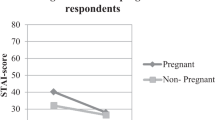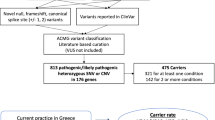Abstract
The aim of this study is to gather information from European clinical geneticists about their practices and attitudes with regard to carrier testing in incompetent children. European clinical institutes where genetic counseling is offered to patients have been contacted. One hundred and seventy-seven of the 287 eligible respondents, corresponding to a response rate of 63%, completed the questionnaire. For all autosomal recessive and X-linked disorders studied, the majority of the respondents were very unwilling or unwilling to provide a carrier test to a 6-year-old asymptomatic child on parental request (range 73–91%). The results of the Wilcoxon–Mann–Whitney U test indicated that for almost all disorders, respondents from Eastern and Southern European countries are more willing to provide a carrier test to a 6-year-old asymptomatic child than respondents from Western and Northern European countries. The Spearman's rank correlation coefficients showed that when a clinical geneticist was unwilling to perform such a test, he/she mostly disagreed that parental uncertainty and anxiety was a good reason to perform a carrier test, he/she mostly disagreed that parents should have the right to decide about such a test, he/she mostly agreed that future autonomy and the confidentiality of genetic information is violated if this test is performed. Overall, the survey showed an adherence to existing recommendations and guidelines regarding carrier testing in incompetent minors. However, for every condition studied, a group of clinical geneticists was willing or very willing to provide a carrier test to a 6-year-old child on parental request.
Similar content being viewed by others
Log in or create a free account to read this content
Gain free access to this article, as well as selected content from this journal and more on nature.com
or
References
Borry P, Schotsmans P, Fryns JP, Dierickx K : Carrier testing in minors: a systematic review of guidelines and positions statements. Eur J Hum Genet 2006; 14: 133–138.
British Medical Association: Human genetics: choice and responsibility. Oxford: University Press, 1998.
Dalby S : GIG response to the UK clinical genetics society report ‘the genetic testing of children’. J Med Genet 1995; 32: 490–491.
Wertz DC, Reilly PR : Laboratory policies and practices for the genetic testing of children: a survey of the Helix network. Am J Hum Genet 1997; 61: 1163–1168.
Balfour-Lynn I, Madge S, Dinwiddie R : Testing carrier status in siblings of patients with cystic fibrosis. Arch Dis Child 1995; 72: 167–168.
Campbell E, Ross LF : Professional and personal attitudes about access and confidentiality in the genetic testing of children: a pilot study. Genet Test 2003; 7: 123–130.
Jarvinen O, Lehesjoki AE, Lindlof M, Uutela A, Kaariainen H : Carrier testing of children for two X linked diseases in a family based setting: a retrospective long term psychosocial evaluation. J Med Genet 1999; 36: 615–620.
Jarvinen O, Lehesjoki AE, Lindlof M, Uutela A, Kaariainen H : Carrier testing of children for two X-linked diseases: a retrospective evaluation of experience and satisfaction of subjects and their mothers. Genet Test 1999; 3: 347–355.
Jarvinen O, Hietala M, Aalto AM et al: A retrospective study of long-term psychosocial consequences and satisfaction after carrier testing in childhood in an autosomal recessive disease: aspartylglucosaminuria. Clin Genet 2000; 58: 447–454.
Jarvinen O, Lehesjoki AE, Lindlof M, Uutela A, Kaariainen H : Carrier testing of children for two X-linked diseases: A retrospective study of comprehension of the test results and social and psychological significance of the testing. Pediatrics 2000; 106: 1460–1465.
Borry P, Schotsmans P, Fryns JP, Dierickx K : Attitudes of minors, parents and health professionals towards carrier testing in minors: a systematic review. Genet Couns 2005; 16: 341–352.
German Society of Human Genetics: Statement on genetic diagnosis in children and adolescents 1995, http://www.gfhev.de/en/.
European Society of Human Genetics: Provision of Genetic services in Europe - current practices and issues 2001, http://www.eshg.org.
Japan Society of Human Genetics: Guidelines for Genetic Testing. J Hum Genet 2001; 46: 163–165.
Ibarreta D, Bock AK, Klein C, Rodriguez-Cerezo E : Towards quality assurance and harmonisation of genetic testing services in the EU. Sevilla. JRC-IPTS, 2003.
Wertz DC : International perspectives; In: Clarke A (ed): The Genetic Testing of Children. Oxford: Bios, 1998, pp 271–289.
Wertz DC : No consensus worldwide. Am J Bioethics 2001; 1: 14–15.
Doukas DJ, Berg JW : The family covenant and genetic testing. Am J Bioethics 2001; 1: 2–10.
Wachbroit R : Rethinking medical confidentiality: The impact of genetics. Suffolk University Law Rev 1993; 27: 1391–1410.
Fanos JH : Developmental tasks of childhood and adolescence: implications for genetic testing. Am J Med Genet 1997; 71: 22–28.
Michie S, Marteau T : Predictive genetic testing in children: the need for psychological research; In: Clarke A (ed).: The Genetic Testing of Children. Oxford: Bios, 1998, pp 169–182.
Sherman SL : Premature ovarian failure in the fragile X syndrome. Am J Med Genet 2000; 3: 189–194.
Acknowledgements
The research for this contribution was supported by the Eurogentest Network of Excellence of the EU, FP6-512148.
Author information
Authors and Affiliations
Corresponding author
Rights and permissions
About this article
Cite this article
Borry, P., Goffin, T., Nys, H. et al. Attitudes regarding carrier testing in incompetent children: a survey of European clinical geneticists. Eur J Hum Genet 15, 1211–1217 (2007). https://doi.org/10.1038/sj.ejhg.5201909
Received:
Revised:
Accepted:
Published:
Issue date:
DOI: https://doi.org/10.1038/sj.ejhg.5201909
Keywords
This article is cited by
-
Experiences of Women Who Have Had Carrier Testing for Duchenne Muscular Dystrophy and Becker Muscular Dystrophy During Adolescence
Journal of Genetic Counseling (2018)
-
“They Just Want to Know” ‐ Genetic Health Professionals' Beliefs About Why Parents Want to Know their Child's Carrier Status
Journal of Genetic Counseling (2017)
-
A qualitative study to explore how professionals in the United Kingdom make decisions to test children for a sickle cell carrier status
European Journal of Human Genetics (2016)
-
Legal approaches regarding health-care decisions involving minors: implications for next-generation sequencing
European Journal of Human Genetics (2016)
-
Why Do Parents Want to Know their Child's Carrier Status? A Qualitative Study
Journal of Genetic Counseling (2016)



